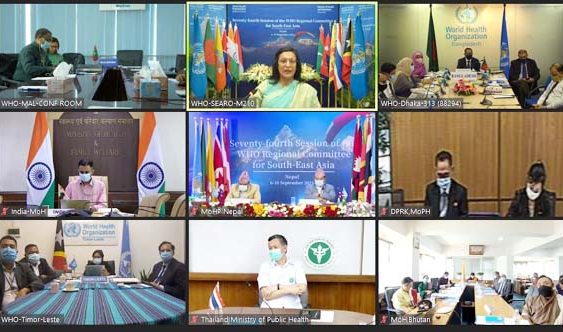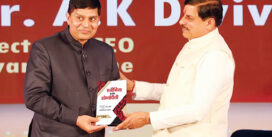- इंदौर एनिमल लिबरेशन की पहल: जानवरों के अधिकारों का हो समर्थन
- सपनों को साकार करने का मंच बन रहा है ‘प्लास्ट पैक 2025’
- शुरू हुआ मध्यभारत का सबसे बड़ा एक्जीबिशन “प्लास्टपैक 2025”, मुख्यमंत्री मोहन यादव ने किया उद्घाटन
- आईडी फ्रेश फूड इंदौर में लेकर आया है ऑथेंटिक साउथ इंडियन इडली डोसा बैटर
- शाओमी इंडिया ने रेडमी 14C 5G को बाज़ार में उतारा और रेडमी नोट 14 5G सीरीज़ के लिए 1000 करोड़ रुपए की शानदार उपलब्धि हासिल की
WHO South-East Asia Regional Committee meeting begins

Kathmandu, 6 September 2021: The Seventy Fourth Regional Committee meeting of WHO South-East Asia Region, began today with health leaders calling for greater commitment to build resilient health systems and to achieve universal health coverage.
“This Session is convened to take important decisions on improving the health status of the people in this Region at a time our health systems are overstretched to cater essential health services to the needy people. Let’s ensure equitable access to vaccines, medicines, tools and technologies for the sake of humanity. Reaching out to the unreached should be our priority,” said the Prime Minister of Nepal, Mr Sher Bahadur Deuba, while inaugurating the annual governing body meeting of WHO in the Region.
The WHO Director-General, Dr Tedros Adhanom Ghebreyesus, said, “the COVID-19 pandemic continues to take a heavy toll on lives, livelihoods, societies and economies. I am pleased to see a decline in cases and deaths in the South-East Asia region, following the devastating surge in May of this year. However, the situation varies widely from country to country and place to place, with steep increases and overwhelmed hospitals in some areas……We must never again allow a pandemic on this scale. And that we must never again allow an injustice on this scale.”
Regional Director Dr Poonam Khetrapal Singh said, “covid has taken a massive toll on our health systems. Services have been disrupted and health care workers exhausted. Our challenge is multi-faceted, we have to regain lost ground in terms of health outcomes, rebuild health systems that have lost capacity and we have to do this at a time when government revenues in all countries will be under intense pressure.”
The five-day virtual session, attended by Health Ministers and senior health officials of the Member countries of the Region, UN Agencies, partners, donors, and civil society representatives, will deliberate on strengthening public health emergency preparedness and response and accelerating progress for prevention and control of non-communicable diseases, among others health issues.
A ministerial roundtable is planned tomorrow on ‘building back better’ the essential health services, hit by the ongoing COVID-19 pandemic, with the aim to achieve universal health coverage.
Other key issues to be discussed are regional framework for vaccine action plan, revitalizing school-health, and ending viral hepatitis, HIV and STIs.
Progress made by the Region on previous Regional Committee resolutions on measles and rubella elimination by 2023, improving access to essential medical products, and strengthening health systems to accelerate delivery of services for non-communicable diseases at the primary health care level, will also be discussed at the session.
Home to one-fourth of the global population but with a disproportionate burden of diseases, the Region has been prioritizing elimination of measles and rubella by 2023, addressing noncommunicable diseases through multisectoral policies and plans, accelerating reduction of maternal, neonatal and under-five mortality, advancing universal health coverage, reversing antimicrobial resistance, scaling-up emergency risk management capacities, eliminating neglected tropical diseases and ending TB.


